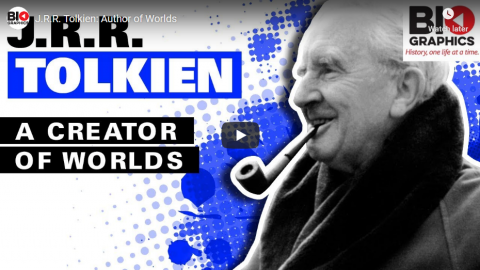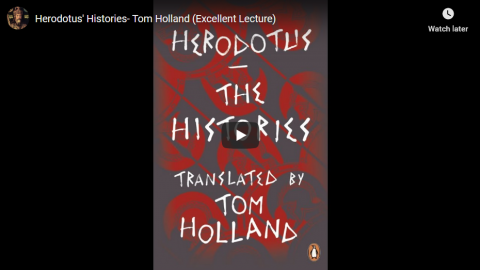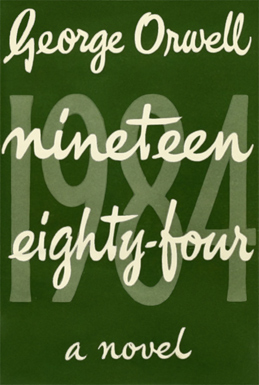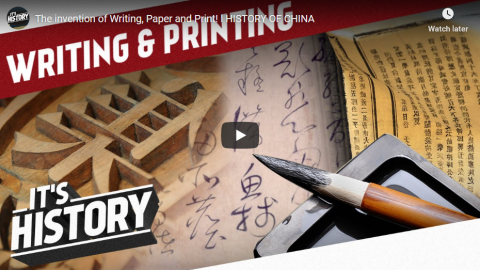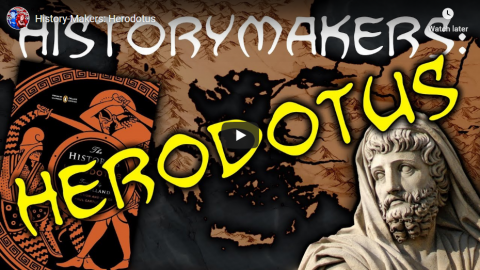Biographics
Published 12 Apr 2018Known as “the father of modern fantasy” his epic tales of legend and lore have been enjoyed by millions of people all over the world — devoured in popular books and adapted for Hollywood blockbuster films. Unbelievably bright, he was a distinguished university professor, poet, historian, and expert linguist. As a child, he even made up his own languages for pure fun.
Visit our companion website for more: http://biographics.org
Credits:
Host – Simon Whistler
Author – Crystal Sullivan
Producer – Samuel Avila
Executive Producer – Shell HarrisBusiness inquiries to biographics.email@gmail.com
Biographies by the book, get J.R.R. Tolkien’s biography from Amazon: http://amzn.to/2ChRfIV
December 20, 2019
J.R.R. Tolkien: Author of Worlds
November 27, 2019
Herodotus’ Histories – Tom Holland
The Study of Antiquity and the Middle Ages
Published 24 Mar 2018The classical scholar Tom Holland introduces his new translation of Herodotus’ masterpiece – The Histories.
The Histories (Greek: Ἱστορίαι; Ancient Greek: [his.to.rí.ai̯]; also known as The History) of Herodotus is now considered the founding work of history in Western literature.
Written in 440 BC in the Ionic dialect of classical Greek, The Histories serves as a record of the ancient traditions, politics, geography, and clashes of various cultures that were known in Western Asia, Northern Africa and Greece at that time. Although not a fully impartial record, it remains one of the West’s most important sources regarding these affairs.
Moreover, it established the genre and study of history in the Western world (despite the existence of historical records and chronicles beforehand).
The Histories also stands as one of the first accounts of the rise of the Persian Empire, as well as the events and causes of the Greco-Persian Wars between the Achaemenid Empire and the Greek city-states in the 5th century BC. Herodotus portrays the conflict as one between the forces of slavery (the Persians) on the one hand, and freedom (the Athenians and the confederacy of Greek city-states which united against the invaders) on the other.
The Histories was at some point divided into the nine books that appear in modern editions, conventionally named after the nine Muses.
November 13, 2019
November 2, 2019
QotD: Business writing
For a long time — well, it seemed like a long time — seven or eight years, I taught effective writing seminars to business people. I was young, and I looked even younger. But I had to get up in front of engineers, chemists, lawyers, sometimes accountants, people who were accomplished in their fields but were not necessarily good at writing, and I was supposed to talk to them about how to write reports and letters and memos. And they challenged me because I looked like I was 10 years old, and they expected to be bored also.
[…]
OK, the most consistent mistake … not mistake, but inefficiency of business writing — and it was very consistent — is the absolute refusal on the part of the writer to tell you right away what message he or she is trying to deliver. I used to say to them, “The most important thing you have to say should be in the first sentence.” And “Oh, no, you can’t. I’m an engineer. We did a 10-year study, this is way too complicated.”
And inevitably, they were wrong. Inevitably, if they really thought about it, they were able to, in one sentence, summarize why it was really important. But they refused to do that because the way they found out was by spending 10 years of study and all this data and everything, and that’s the way they wanted everyone to look at what they did. They wanted their supervisors to go plowing through all they had done to come to this brilliant conclusion that they had come to.
COWEN: Through their history, through their thought patterns.
Drag everybody through it. And it was the one thing the newspaper people were taught to do that made more sense. You don’t have your reader’s attention very long, so get to the point. I found it was very difficult to get even really smart businesspeople to get to the point. Sometimes it was because they really couldn’t tell you what the point was.
What I wanted to say, but rarely felt comfortable saying, was, “If you don’t know what the point is, then you can’t really write this report.” But it was always too complicated for a layperson like me to understand. That was the way they did it. I was being hired by their bosses to tell them, “No, we want you to write clearly, and we want you to get to the point.”
COWEN: And why were they, at this meta level, resistant to your message?
Because nobody else was doing it. When I would start the class, I’d have 32 people in the class typically, and when they would turn in all their samples of writing, every one of them wrote the same way. They all wrote business-ese writing. This is my parody of it, but it was, “Enclosed please find the enclosed enclosure.” That kind of formal, nonsensical, meaningless flow of words. Somewhere in there would be something important, something significant, or maybe not.
Dave Barry, interviewed by Tyler Cowan in “Dave Barry on Humor, Writing, and Life as a Florida Man”, Medium, 2017-08-16.
October 26, 2019
QotD: Pulp fantasy writers
All the great fantasies, I suppose, have been written by emotionally crippled men. [Robert E.] Howard was a recluse and a man so morbidly attached to his mother that when she died he committed suicide; Lovecraft had enough phobias and eccentricities for nine; Merritt was chinless, bald and shaped like a shmoo. The trouble with Conan is that the human race never has produced and never could produce such a man, and sane writers know it; therefore the sick writers have a monopoly of him.
Damon Knight, quoted by John C. Wright, “Conan and the Critic”, John C. Wright’s Journal, 2017-11-01.
October 19, 2019
QotD: Writing to length
Having spent a good deal of my life writing short pieces on serious subjects for newspapers and magazines, I’ve learned from experience to write organically short – that is, to write a five-hundred-word draft of a five-hundred-word piece instead of writing a thousand-word draft and cutting it in half. Not only does this reduce waste motion, but the finished product is almost always better. When you write a long piece and chop it down to size, it tends to read … well, choppily.
So why do inexperienced authors write long? I suspect it’s because they assume that they’ll get only one chance to impress the editor, which causes them to empty their bag of tricks every time they write a piece. (This reminds me of another of my critical commandments: Don’t tell everything you know.) Flashiness is a sin of youth. The older and more self-assured a writer is, the more likely he is to appreciate the virtues of simplicity and economy.
I don’t know whether it’s possible to teach this lesson to young writers. The older I get, the more I wonder whether anything can be taught to anyone. Still, I did my best to get it across to my students, and I like to think that at least some of them were paying attention.
Terry Teachout, “To the point”, About Last Night, 2007-06-01.
October 11, 2019
QotD: Religious hysteria
As for […] the idea that we could lose our freedom by succumbing to a wave of religious hysteria, I am sorry to say that I consider it possible. I hope that it is not probable. But there is a latent deep strain of religious fanaticism in this, our culture; it is rooted in our history and it has broken out many times in the past.
It is with us now; there has been a sharp rise in strongly evangelical sects in this country in recent years, some of which hold beliefs theocratic in the extreme, anti-intellectual, anti-scientific, and anti-libertarian.
It is a truism that almost any sect, cult, or religion will legislate its creed into law if it acquires the political power to do so, and will follow it by suppressing opposition, subverting all education to seize early the minds of the young, and by killing, locking up, or driving underground all heretics. This is equally true whether the faith is Communism or Holy-Rollerism; indeed it is the bounden duty of the faithful to do so. The custodians of the True Faith cannot logically admit tolerance of heresy to be a virtue.
Nevertheless this business of legislating religious beliefs into law has never been more than sporadically successful in this country — Sunday closing laws here and there, birth control legislation in spots, the Prohibition experiment, temporary enclaves of theocracy such as Voliva’s Zion, Smith’s Nauvoo, and a few others. The country is split up into such a variety of faiths and sects that a degree of uneasy tolerance now exists from expedient compromise; the minorities constitute a majority of opposition against each other.
Could it be otherwise here? Could any one sect obtain a working majority at the polls and take over the country? Perhaps not — but a combination of a dynamic evangelist, television, enough money, and modern techniques of advertising and propaganda might make Billy Sunday’s efforts look like a corner store compared to Sears Roebuck.
Throw in a Depression for good measure, promise a material heaven here on earth, add a dash of anti-Semitism, anti-Catholicism, anti-Negrosim, and a good large dose of anti-“furriners” in general and anti-intellectuals here at home, and the result might be something quite frightening — particularly when one recalls that our voting system is such that a minority distributed as pluralities in enough states can constitute a working majority in Washington.
Robert A. Heinlein, “Concerning Stories Never Written”, Revolt in 2100, 1953.
October 6, 2019
The cultural influence of George Orwell
George Orwell, the chosen pen name of Eric Blair, is one of the best known writers of the 20th century and even people who have never read any of his writings are aware of his influence. John Rodden and John Rossi outline the immediate post-war period that saw Orwell publish his final and best-known work:
Seven decades ago on June 8, George Orwell’s Nineteen Eighty-Four exploded on the cultural front—fittingly enough, just two months before the Soviet Union’s first successful atomic test that August, which broke America’s nuclear monopoly. Orwell’s warning was urgent — and timely. Almost overnight, in the wake of the surrender of Germany and Japan that ended World War II in 1945, a new war—the so-called Cold War — had emerged. (Orwell is often credited with coining the term.)
The Cold War pitted the capitalist West against the communist East, above all the United States against the USSR (and soon China). Just three weeks before the publication of Nineteen Eighty-Four, the Soviet Union lifted the Berlin Blockade, thereby avoiding a potentially deadly showdown with the West that might have triggered World War III. Two weeks later, on May 23, the Federal Republic of Germany (West Germany) was officially established, effectively ending prospects in the near future of German reunification. On the very day of Nineteen Eighty-Four‘s publication, June 8, fears swept through liberal America of a growing Red Scare when a leaked document named numerous celebrities as Communist Party members (e.g., Helen Keller, Dorothy Parker, Fredric March, Danny Kaye, Edward G. Robinson). That same month, the communist armies of Mao Zedong captured Shanghai, and less than six months later on October 1, declared victory in the civil war against the American-backed Nationalists and the founding of the People’s Republic of China.
What educated person is not at least vaguely familiar with the language and vision of Orwell’s novel — even if he or she does not recognize the source? Indeed the very ignorance of the source represents an inadvertent tribute to the power of Orwell’s language and vision. Like Shakespeare’s poetry (“All the world’s a stage,” “To be or not to be,” “This above all: to thine own self be true”), so deeply have some of Orwell’s locutions become lodged in the cultural lexicon and political imagination that most people no longer recognize their author, let alone the source.
Today, as in the case of Shakespeare, hundreds of millions of people mouth Orwell’s coinages and catchphrases, such as “Big Brother” and “doublethink” — including his name as proper adjective, “Orwellian” (i.e., nightmarish, oppressive). And that’s just in English. Tens of millions more recognize and repeat them in foreign translations, as I [Rodden] discovered in our travels and teaching in the communist East Germany as well as in Asia. Rudimentary acquaintance with such locutions is regarded as a sine qua non of cultural literacy in English — even today, when prolefeed (mindless chatter) floods the print columns and dominates the airwaves.
Nineteen Eighty-Four represents Orwell’s Orwellian vision — in the form of a fictional anti-utopia (or “dystopia”) — of what a nightmarish, oppressive future might hold. It projects a world 35 years away — half the biblical lifespan of three score and ten. Having completed his novel by the end of 1948, Orwell flipped the last two digits to underscore his anti-utopian theme of a world turned upside down and inside out. Or so many scholars have reasonably claimed. The date resultant from the flipped digits also gave the novel its immediacy. Previous anti-utopias, such as Aldous Huxley’s Brave New World (1932), had cast their ominous scenarios far into the future, which lessened their dramatic impact and tended to render them entertaining thought experiments. (Huxley’s action is set in the 26th century.) By contrast, Orwell’s dire future is too close for comfort — and depicts the planet in the immediate aftermath of a global nuclear war that has nearly annihilated the human species. His vision thus projects a world in which middle-aged readers in 1949 might find themselves in old age — and certainly their children and grandchildren were likely to witness it. (If he had lived, Orwell himself would have still been just 80 years old on April 4, 1984, when the story opens.)
September 18, 2019
The invention of Writing, Paper and Print! l HISTORY OF CHINA
IT’S HISTORY
Published on 22 Jul 2015The invention of script, paper and printing can be credited to the Chinese. It was in China that Cai Lun, in his emperor’s service, made the production of paper suitable for the masses. Originally planned as a means to wrap things in, it soon became obvious that paper was more suitable for writing than the common bamboo stick. Guy explains how the Chinese printed written pages long before Gutenberg was born, how Chinese writing actually works and how emperor Qin tried to establish the standardized Chinese Han Characters, or Hanzi, attempting to unify the writing symbols for his country.
» SOURCES
Videos: British Pathé (https://www.youtube.com/user/britishp…)
Pictures: mainly Picture Alliance
Content:
Faulmann, Carl (1995): Schriftzeichen und Alphabete aller Zeiten und Völker. Augsburg. Reprint der Originalausabe von 1880 Wien.
Pan, Jixing (1998): “On the origin of movable metal-types”. In: Chinese Science Bulletin 43 (20).
Wai Wong (2005): “Typesetting Chinese. A personal perspective”. In: TUGboat 26 (2) 111-114.
https://www.tug.org/TUGboat/tb26-2/wo…
Yan, Yangtse (2006): “New Evidence suggests longer paper making history in China”. http://news.xinhuanet.com/english/200…» ABOUT US
IT’S HISTORY is a ride through history – Join us discovering the world’s most important eras in IN TIME, BIOGRAPHIES of the GREATEST MINDS and the most important INVENTIONS.» HOW CAN I SUPPORT YOUR CHANNEL?
You can support us by sharing our videos with your friends and spreading the word about our work.» CAN I EMBED YOUR VIDEOS ON MY WEBSITE?
Of course, you can embed our videos on your website. We are happy if you show our channel to your friends, fellow students, classmates, professors, teachers or neighbors. Or just share our videos on Facebook, Twitter, Reddit etc. Subscribe to our channel and like our videos with a thumbs up.» CAN I SHOW YOUR VIDEOS IN CLASS?
Of course! Tell your teachers or professors about our channel and our videos. We’re happy if we can contribute with our videos.» CREDITS
Presented by: Guy Kiddey
Script by: Martin Haldenmair
Translated by: Guy Kiddey
Directed by: Daniel Czepelczauer
Director of Photography: Markus Kretzschmar
Music: Markus Kretzschmar
Sound Design: Bojan Novic
Editing: Markus KretzschmarA Mediakraft Networks original channel
Based on a concept by Florian Wittig and Daniel Czepelczauer
Executive Producers: Astrid Deinhard-Olsson, Spartacus Olsson
Head of Production: Michael Wendt
Producer: Daniel Czepelczauer
Social Media Manager: Laura Pagan and Florian WittigContains material licensed from British Pathé
All rights reserved – © Mediakraft Networks GmbH, 2015
September 16, 2019
History-Makers: Herodotus
Overly Sarcastic Productions
Published on 13 Sep 2019Signup for your Free trial to The Great Courses Plus here: http://ow.ly/diiG30oC0Lk
There is much to do, and many unknowns on our horizon! — One of those unknowns is “How did Herodotus become the Father of History” and why is his book so confusingly organized? All that and more on this installment of History-Makers!
Let me know which History writer you’d like me to discuss next in the comments below!
PATREON: https://www.Patreon.com/OSP
DISCORD: https://discord.gg/sS5K4R3
MERCH LINKS: https://www.redbubble.com/people/OSPY…
OUR WEBSITE: https://www.OverlySarcasticProductions.com
Find us on Twitter https://www.Twitter.com/OSPYouTube
Find us on Reddit https://www.Reddit.com/r/OSP/— — —
The Great Courses Plus is currently available to watch through a web browser to almost anyone in the world and optimized for the US, UK and Australian market. The Great Courses Plus is currently working to both optimize the product globally and accept credit card payments globally.
September 13, 2019
QotD: Orwell’s campaign against the jackboot
In spite of my campaign against the jackboot — in which I am not operating single-handed — I notice that jackboots are as common as ever in the columns of the newspapers. Even in the leading articles in the Evening Standard, I have come upon several of them lately. But I am still without any clear information as to what a jackboot is. It is a kind of boot that you put on when you want to behave tyrannically: that is as much as anyone seems to know.
Others besides myself have noted that war, when it gets into the leading articles, is apt to be waged with remarkably old-fashioned weapons. Planes and tanks do make occasional appearances, but as soon as an heroic attitude has to be struck, the only armaments mentioned are the sword (“We shall not sheathe the sword until”, etc., etc.), the spear, the shield, the buckler, the trident, the chariot and the clarion. All of these are hopelessly out of date (the chariot, for instance, has not been in effective use since about A.D. 50), and even the purpose of some of them has been forgotten. What is a buckler, for instance? One school of thought holds that it is a small round shield, but another school believes it to be a kind of belt. A clarion, I believe, is a trumpet, but most people imagine that a “clarion call” merely means a loud noise. One of the early Mass Observation reports, dealing with the coronation of George VI, pointed out that what are called “national occasions” always seem to cause a lapse into archaic language. The “ship of state”, for instance, when it makes one of its official appearances, has a prow and a helm instead of having a bow and a wheel, like modern ships. So far as it is applied to war, the motive for using this kind of language is probably a desire for euphemism. “We will not sheathe the sword” sounds a lot more gentlemanly than “We will keep on dropping block-busters”, though in effect it means the same.
One argument for Basic English is that by existing side by side with Standard English it can act as a sort of corrective to the oratory of statesmen and publicists. High-sounding phrases, when translated into Basic, are often deflated in a surprising way. For example, I presented to a Basic expert the sentence, “He little knew the fate that lay in store for him” — to be told that in Basic this would become “He was far from certain what was going to happen”. It sounds decidedly less impressive, but it means the same. In Basic, I am told, you cannot make a meaningless statement without its being apparent that it is meaningless — which is quite enough to explain why so many schoolmasters, editors, politicians and literary critics object to it.
George Orwell, “As I Please” Tribune, 1944-08-04.
August 29, 2019
August 15, 2019
QotD: Strong female characters in fiction
If you’d asked me at twelve, I’d have told you I had no idea why the story charmed me as it did. I only knew I liked re-reading it and it became one of my favorite books. It felt good and somehow “right” in a way that fairytales and romances didn’t.
Today, when I telling the kids about it, I realized why. It was because the character was a strong woman. Born with the ultimate disadvantage, the ultimate lack of support, she doesn’t – like fairytale princesses – either get rescued by a strong knight nor even by fate that reveals her to be a hidden princess. Also, she never complains; she never repines – she takes the situation she finds herself in and makes the best out of it, all the while looking out for those who are weaker or in more need than her. This last characteristic nets her the all-important recipe book (supposedly created by a medieval convent, which rings true for Portugal, and lost for centuries.) When her romance doesn’t work because her very conventional suitor wants a girl of suitable family, she doesn’t go into a decline, she just goes on with life.
She is, in fact, what editors so often say they want “a strong woman heroine, self sufficient, a good role model for growing girls.” Only, from my observation and reading, by this they usually mean mouthy, aggressive, foolhardy and complains a lot about men till one wonders if said character has an issue with being born female. There are exceptions, of course, but complaining about fate and men and being bitter seems to be obligatory.
And yet, it is true that this type of character is not only a great role model for young women, she is the type of role model we do need. Earth needs women (yes, and men, but we’re talking women here) who take care of the weak and helpless. Earth needs women who don’t whine. Earth needs women who cheerfully shoulder the burden of what needs to be done.
Earth does not need women who complain about men all the while neurotically obsessing on clothes and jewelry to attract said men and pursuing the highest-status males they can possibly get. There is nothing wrong with these activities, in moderation, but when they become the focus of existence they create a generation of infantile harpies. Now, I don’t think any women in real life are as bad as that, but almost all women characters in books and movies are just like that.
Young women who read/watch these characters end up feeling they must APPEAR like them or they’ll be thought weak. And this is wrong. Strength in women – and men – can be defined not as throwing weight around but in doing what must be done for oneself and those who depend on one.
Earth needs grown up women.
I very much hate to tell people what to do, much less what to be, but I wish we could set about writing – and living – role models for the women Earth needs.
Sarah Hoyt, “Earth Needs Women a blast from the past of November 2010”, According to Hoyt, 2017-07-13.
August 7, 2019
QotD: “Great” “Art”
If you still don’t think the myth of the unappreciated writer, who labors in extreme poverty but creates True Art™, is nonsense, let me explain.
How do we know it’s true art? And before you start making gestures and sputtering, to finally come back with “knowledgeable people know that,” let me cut through the fog. The answer is, we don’t. No, not even experts. If everyone knew what great art was, investment in art wouldn’t be such a risky business. Great art, great literature, any form of “greatness” in creative expression is ultimately “What future generations think is great.” And, like all speculation about the future, it’s difficult, if not impossible. In visual art, what is often the acclaimed taste of an era is the laughable, ridiculous pastiche of a later era. In literature … Do me a favor, let your fingers do the walking through Gutenberg, then look up the biographies of some of those authors. Many of the people who make you say “who?” and who in fact would make anyone but an expert in the literature of their time go “who?” were literary lions in their times, acclaimed by all and pronounced “the next Shakespeare.” (Who, like “the next Heinlein,” used to rise every generation until people got tired of it.)
If the art is so great, how come no one is buying it? Besides the artist who is spending way too much time with absinthe and way too little time with quill and paper, or brushes and canvas, that is?
Oh. I see. Because the general public is too stupid to appreciate the greatness of the artist. Because the artist is “ahead” of the public.
Yeah, if you believe that you probably also think that history comes with an arrow since obviously art does. That is, art moves from “primitive” to “exquisite and advanced.” If you truly believe this, I invite you to go through any local art museum and move through it from, say, Roman times till now. And then I invite you to think. The Denver Museum of Art has an installation that consists of a bunch of twisted-together kitchen implements, something that often happens in my house due to the habit of overfilling drawers and my tendency – pre-coffee – to think there is no problem brute force can’t solve.
This is an “installation” worth 2 million and if you believe it is superior to Leonardo da Vinci’s Virgin of the Rocks, you should stop hitting the absinthe. No, wait. Have another cup. I have this installation …
Sarah Hoyt, “What Happens When the Artist Chides His Audience?”, PJ Media, 2017-07-13.
August 2, 2019
QotD: What we mean by “civilization”
… I floated that there might have been “civilizations” between the emergence of anatomically modern humans, and ya’ll objected because no signs of dentistry, no extensive mining operations and even the crab bucket, I thought “Well, absence of evidence is not evidence of absence.” It wasn’t till yesterday morning that I stopped and went “waitaminut, Czar Nicholas’ skeleton showed signs of prolonged and horrific abscesses. We only found out how extensive the Roman mining operation in the village was when it rained for a month and roads collapsed under cars. And even with the crab bucket and no Judeo-Christian ethic, ancient Asia had a lot of very advanced, flourishing civilizations.”
Which is when the dime dropped and I realized you guys immediately translated civilization to “as good as we have or better.” Which, of course, made me giggle. Because I’d have liked you to tell a Roman, with their world-bestriding empire that they weren’t civilized. Or, before that a classical Greek.
Understand I am not imagining others before us had the internal combustion engine, or steam, or trains, or … Sure, they might have, but that’s a heck of a coincidence, since those things usually come about by an individual stroke of genius, and even when they do they often aren’t used the way we did (Romans and their mechanical toys.)
To imagine other civilizations of which we’ve forgotten every trace followed exactly the same route we did to the same place we’re at requires believing that inventing steam and the internal combustion engine and harnessing electricity is as natural to humans as dams to beavers.
Now, maybe that’s true. It would certainly make for a very good science fiction story. (Short story, I think. Too much of a punchline thing for a novel.) BUT the odds defy rationality.
I was imagining, you know “builds houses of wood or stone. Domesticated SOME animals. Has villages and cities. Might have trade over long routes. MIGHT have had wheeled vehicles.” (The last, as we know, one can have quite sophisticated civilizations without.)
Look, it’s not your fault. Since the seventies, we’ve been bombarded by crazy BS about superior aliens or superior lost civilizations. (And before that, there was a trickle of it, too, going back I think to the eighteenth century, just couched in different terms.) You’ll get stuff about how the pyramids were built of stones that floated at the sound of a certain note. (A C note, or the equivalent, I bet. “Listen, Mac, you take this stone to the top of the pyramid, I give you a C Note. A hundred Amontheps in your pocket, bucko. Buys a lot of fish and falafel.”)
Part of this, and part of the reason it intensified since the seventies were the “unilateral disarmament people.” You know, those jokers who wanted us to get rid of our own nukes and stand disarmed in front of the USSR, who would then realize we were peaceful, and not attack, and everyone would live in peace and harmony with rainbows and farting unicorns. Yes, it was a stupid and crazy idea since the continued survival of the USSR depended on plunder and conquest. But I’ll remind you our last president still believes that bag of moonshine. All of it, including the unicorn farts.
Sarah Hoyt, “We Are The Superior Civilization”, According to Hoyt, 2017-05-15.

